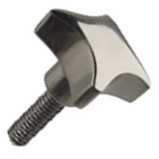
Ever wonder if stainless steel is magnetic? Consisting primarily of iron and chromium, stainless steel is one of the world’s most commonly used materials. It’s strong, durable and resistant to corrosion. Unless you’ve tested it firsthand, however, you might be wondering if stainless steel is magnetic as well.
Some Types of Stainless Steel Are Magnetic
There are many different types of stainless steel, some of which are magnetic, whereas others are nonmagnetic.
All types of stainless steel are classified as iron alloys, meaning they consist of iron mixed with other metals and elements. Some types of stainless steel, though, contain different kinds of metals and elements than others. These nuances in composition can lead to microstructure changes that determine whether a particular type of stainless steel is magnetic.
Ferritic and Martensitic Stainless Steel Is Magnetic
The microstructure of stainless steel is ultimately what determines if stainless steel is magnetic. There are several types of steel microstructures, including ferritic, martensitic and austenitic. Of those microstructure types, ferritic and martensitic are magnetic.
Ferritic stainless steel is characterized by a high concentration of chromium and a low concentration of nickel. It features a body-centered cubic (BCC) crystal structure, which attracts them to magnets. Grade 430 and 409 stainless steel are both ferritic and, thus, magnetic.
Martensitic stainless steel is also magnetic. It’s characterized by a moderate concentration of chromium and a low concentration of nickel. During production, martensitic stainless steel undergoes heat treatment to achieve greater hardness. Grade 409 is a common type of martensitic stainless steel.
Why Isn’t Austenitic Stainless Steel Magnetic?
Unlike ferritic and martensitic stainless steel, austenitic stainless steel isn’t magnetic. The most common type of stainless steel, austenitic stainless steel contains a higher concentration of chromium and nickel than its counterpart. As a result, austenitic stainless steel is typically nonmagnetic.
There are some exceptions regarding austenitic stainless steel and magnetism. When cold-worked, for instance, some of the austenite may be converted into martensite, resulting in magnetic properties. Nonetheless, most austenitic stainless is either nonmagnetic or it exhibits a low level of magnetism.
In Conclusion
Not all stainless steel is the same. There are many different types of stainless steel, some of which have a different microstructure than others. Stainless steel with a ferritic or martensitic microstructure is magnetic, whereas stainless steel with an austenitic microstructure is nonmagnetic or minimally magnetic.
